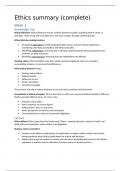Samenvatting
Samenvatting - Complete summary Ethics 2024 (E_IBA3_ETH)
- Instelling
- Vrije Universiteit Amsterdam (VU)
Summary of key points of the lectures & knowledge clips of the Ethics course, easy to understand, study and memorize. Includes key concepts in bold!
[Meer zien]




